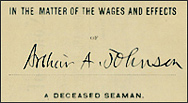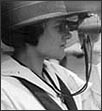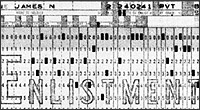
Genealogy Notes
- African American History
- American Indians
- Boxer Rebellion
- Census
- Civil War
- Civilian Service
- Court Records
- Disabled Veterans Homes
- Headstones
- Immigration and Naturalization
- Korean and Vietnam Wars
- Local History
- Mexican Punitive Expedition
- Military Service Overview
- Panama Canal
- Philippine Insurrection
- Pre–Civil War
- Private Claims
- Spanish-American War
- World War I
- World War II
- More Sources
Special Issue on African American Research and Federal Records (Summer 1997)
Exodus to Kansas: The 1880 Senate Investigation of the Beginnings of the African American Migration from the South (Summer 2008) - Learn about an 1880 congressional inquiry regarding mass African American migration to Kansas.
"Their . . . Bedding is wet Their floors are damp": "Pre-Bureau" Records and Civil War African American Genealogy (Summer 2007) - Discover what the records show about life for African American refugees before the Freedmen's Bureau.
Sealing the Sacred Bonds of Holy Matrimony: Freedmen's Bureau Marriage Records (Spring 2005) - A state-by-state look at marriage licenses, certificates, registers, and reports in federal records that document marriages of former slave couples.
The Rost Home Colony, St. Charles Parish, Louisiana (Fall 2001) - Finding family ties in the records of a Freedmen's Bureau experiment.
Researching African Americans in the U.S. Army, 1866–1890: Buffalo Soldiers and Black Infantrymen (Spring 2001) - How to find the military records of African American soldiers who served in the late 19th-century.
Marriage Registers of Freedmen (Fall 1973) - Learn about an invaluable source for African American family history.
Native Americans in the Antebellum U.S. Military (Winter 2007) - Hundreds of American Indians served in the U.S. military between 1815 and 1858. Learn how to find them in the records.
Native Americans in the Census, 1860–1890 (Summer 2006) - Genealogists pursuing Native American ancestry should look for leads in earlier censuses.
Indian Bounty Land Applications (Fall 1993) - A source for the difficult task of tracing Indian ancestors back to the early 19th century.
Lead the Way (Summer 2009) A guide to researching U.S. Army Indian Scouts from 1866 to 1914.
U.S. Marines in the Boxer Rebellion (Winter 1999) - Research the service of U.S. Marines who served in China in 1900.
The Forgotten Federal Census of 1885 (Fall 2008) - An "extra" census helps researchers find information that may not be found anywhere else.
Native Americans in the Census, 1860–1890 (Summer 2006) - Genealogists pursuing Native American ancestry should look for leads in earlier censuses.
Plans of Division: Describing the Enumeration Districts of the 1930 Census (Fall 2003) - The Census Bureau divides up the country into manageable pieces to conduct the 1930 census.
"Blisters on My Heels, Corns on My Toes": Taking the 1930 Census of Population (Winter 2002) - The story of the people behind the taking of the 1930 population census. How did the Census Bureau gather that vast amount of data?
The 1930 Census in Perspective (Summer 2002) - The 1930 census reflected the emerging values of early 20th-century America.
The WPA Census Soundexing Projects (Spring 2002) - The indexing projects put unemployed people to work during the Great Depression of the 1930s and were begun because the Bureau of the Census needed indexes for its own needs.
Myths and Realities about the 1960 Census (Winter 2000) - Corrects the myth that substantial data from the 1960 census has been lost because the hardware to read the tapes is obsolete.
"First in the Path of the Firemen": The Fate of the 1890 Population Census (Spring 1996) - The story of the 1921 fire that destroyed most 1890 census schedules and its aftermath.
Enhancing Your Family Tree with Civil War Maps (Summer 2003) - How to use an often-overlooked resource for filling out your Civil War research.
The Army Medal of Honor: The First Fifty-five Years (Summer 2001) - The Civil War origins of the Medal of Honor and guidance on how to find records of recipients.
Researching Confederate Marines in the Civil War (Winter 2001) - Tips for researching an often overlooked group of Civil War servicemen.
The Shady Side of the Family Tree: Civil War Union Court-Martial Case Files (Winter 1998) - Often, researching a family member's Civil War military service can be a double-edged sword.
Which Henry Cook? A Methodology for Searching Confederate Ancestors (Fall 1995) - How to use NARA records to pin down the identity of a Confederate soldier.
Civil War and Later Navy Personnel Records at the National Archives, 1861–1924 (Summer 1995) - United States Navy personnel records for the period 1861–1924 are one of the best secrets in genealogical research.
Civil War Draft Records: Exemptions and Enrollments (Winter 1994) - Looking for men who did not serve in the Civil War.
Confederate Medical Personnel (Spring 1994) - How to find your Civil War-era ancestor, if he or she served the Confederate army in a medical capacity, in the War Department Collection of Confederate Records.
Income Tax Records of the Civil War Years (Winter 1986) - Discover valuable information in records of the first U.S. income tax.
Serving at the Pleasure of the President: The Nomination Papers of the United States Senate, 1789–1946 (Winter 2005) - In providing "advice and consent" for Presidential appointments, the Senate has also produced a lot of controversy and drama.
The Official Register of the United States, 1816–1959 (Winter 2004) - Explore the national directory of employees, agents, and officers of the federal government.
Strategies for Reconstructing Careers of Foreign Service Officers, 1869–1887 (Spring 1999) - A guide through 19th-century political patronage in the U.S. foreign service.
"You have the body": Habeas Corpus Case Records of the U.S. Circuit Court for the District of Columbia, 1820–1863 (Fall 2005) - These case files can provide names of individuals and family members; birth, marriage, and death information; and detailed information on the daily lives of the people involved in the cases.
The National Home for Disabled Volunteer Soldiers (Spring 2004) - Using records of veterans homes to gather information about Civil War and later veterans.
Honoring Our War Dead: The Evolution of the Government Policy on Headstones for Fallen Soldiers and Sailors (Spring 2003) - Learn when the government started providing headstones for military personnel and how to use the records in your genealogical research.
Immigration and Naturalization
A Gold Mine of Naturalization Records in New England (Fall 2004) — A valuable set of naturalization records for five New England states.
By Way of Canada: U.S. Records of Immigration Across the U.S.-Canadian Border, 1895–1954 (St. Albans Lists) (Fall 2000) - A guide to using immigration records of the U.S.-Canadian border.
"Any woman who is now or may hereafter be married . . .": Women and Naturalization, ca. 1802–1940 (Summer 1998) - An examination of why women are not represented in early naturalization records.
Electronic Records of Korean and Vietnam Conflict Casualties (Spring 2000) - Online resources: state casualty list extracts from the Korean and Vietnam conflicts.
The Records of the D.C. Metropolitan Police, 1861–1930 (Spring 2008) - Police records document the historical and social fabric of the nation's capital.
The Final Voyage of the Portland: Reconstructing the List of the Steamer's Crew through NARA Records (Winter 2006) - The crew manifest went down with the ship off New England in 1898, but using NARA records, it is possible to reconstruct it.
Those Elusive Early Americans: Public Lands and Claims in the American State Papers, 1789–1837 (Summer 2005) - The thousands of claims and other records preserved from the records of the Senate and House contain a wealth of information on individuals and families living in America from 1789 to 1838.
Researching the Career of a Nineteenth-Century Physician (Summer 2004) - Using NARA records to fill out details of the life of a locally notable individual.
De Smet, Dakota Territory, Little Town in the National Archives (Winter 2003) - Finding records of Laura Ingalls Wilder's family in the National Archives.
The United States Armed Forces and the Mexican Punitive Expedition (Fall & Winter 1997) - Background on the expedition and guidance on doing genealogical research on the participants.
An Overview of Records at the National Archives Relating to Military Service (Fall 2002) - A useful starting point for those researching individuals whose service records may be in the National Archives Building in Washington, D.C.
Coastal Bastions and Frontier Forts (Fall 2009) - Learn what can be found by researching U.S. military posts from 1821 to 1920.
Looking for an Ancestor in the Panama Canal Zone, 1904–1914 Explore court records created during the building of the Atlantic-Pacific link.
Researching Service in the U.S. Army during the Philippine Insurrection (Summer 2000) - How to document an ancestor's military service in an often-overlooked conflict.
Follow the Money: Tracking Revolutionary War Army Pension Payments (Winter 2008) - How to track down the actual pension payments made to Revolutionary War Army veterans and widows.
Early Navy Personnel Records at the National Archives, 1776–1860 (Spring 1995) - Clues to searching for genealogical information in pre–Civil War navy records.
Indian Bounty Land Applications (Fall 1993) - A source for the difficult task of tracing Indian ancestors back to the early 19th century.
Genealogical Fallout from the War of 1812 (Spring 1992) - Discusses the wealth of information contained in Seamen's Protection Certificate Applications.
Do We Have Any Records Relating to French Spoliation Claims? (Spring 1991) - Investigate claims presented by U.S. citizens against France, Spain, and Holland for vessels and cargo taken by privateers before September 30, 1800.
Genealogical Records of the War of 1812 (Winter 1991) - How to use military records to research a War of 1812 veteran.
A Final Appeal to Capitol Hill: The U.S. House's Accompanying Papers File, 1865–1903 (Spring 2007) - Citizens exercising their constitutional right to petition left future generations a wealth of genealogical information.
Special Issue on the Spanish-American War (Spring 1998)
The Story of the Female Yeomen during the First World War (Fall 2006) - The vague language of the Naval Act of 1916 opened the door to women volunteering in the U.S. Navy.
World War I Gold Star Mothers Pilgrimages, Part I (Summer 1999) and Part II (Fall 1999) - Mothers and widows of U.S. soldiers who died overseas during World War I sailed to Europe to see the graves of their sons and husbands.
They Answered the Call: Military Service in the United States Army during World War I, 1917–1919 (Fall 1998) - A guide to looking for information about World War I army veterans.
"How an eagle feels when his wings are clipped and caged" (Winter 2009) - Japanese internment camp newspapers provided a sense of community in World War II, and provide a unique insight for researchers today.
The World War II Army Enlistment Records File and Access to Archival Databases (Spring 2006) - World War II Army Enlistment Records are available through NARA's Access to Archival Databases (AAD) resource.
For other articles of interest, visit the Prologue Index of Previous Issues page.
















